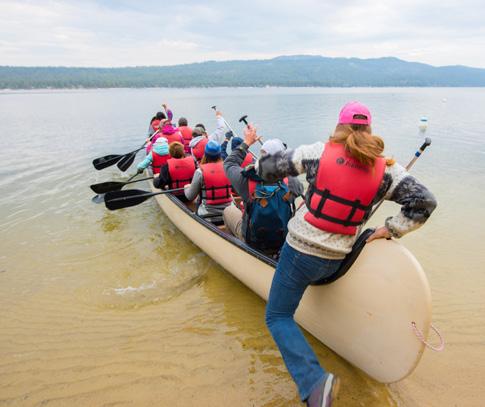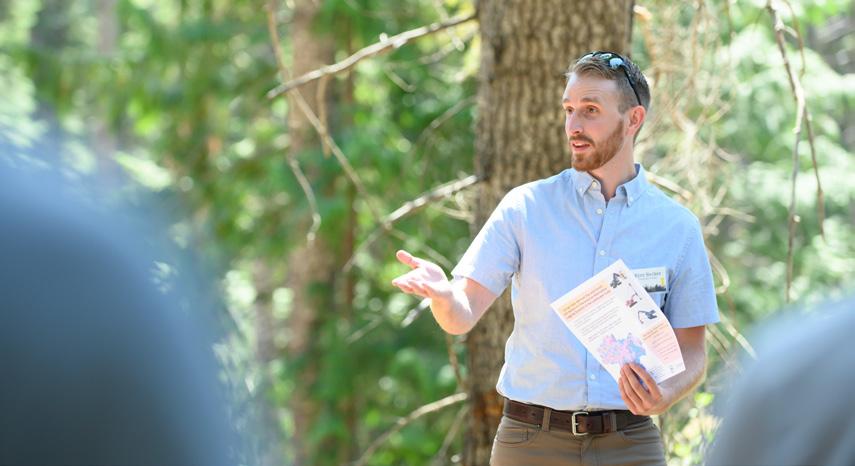








The McCall Field Campus is located on the homelands of the Nimiipu (Nez Perce). We extend gratitude to the indigenous people that call this place home, since time immemorial.
The University of Idaho recognizes that it is our academic responsibility to build relationships with the indigenous people to ensure integrity of tribal voices.





Our mission is to work towards reciprocal relationships between people, land, and water, by partnering with communities on innovative research and transformative learning experiences.
START August 13
August 13—May 28

FALL BREAK November 24-28
FALL SEMESTER
WINTER BREAK December 13January 5
SPRING SEMESTER FALL WRAP-UP
SPRING BREAK March 16-20
SPRING WRAP-UP
Into the Wilderness May 18-22
Graduation Celebration May 29
FALL SEMESTER COURSE LIST
NRS 562 Intro to Field Science Teaching
NRS 563 Land-Based Education
NRS 560 Place-Based Ecology
NRS 567 Teaching Practicum
NRS 557 Team Leadership for Environmental Educators
NRS 501 Socio-ecological Systems Seminar I
SPRING AND SUMMER SEMESTER COURSE LIST
NRS 564 Teaching in a Winter Environment
NRS 565 Science Communication and the Environment
NRS 566 Place-based Ecology II
NRS 568-569 Teaching Practicum II and III
NRS 557 Community Leadership for Environmental Educators
NRS 501 Socio-ecological Systems Seminar II
NRS 599 Portfolio Development
Reach out to our team today. Contact Leslie and Gary at cnr-mnr-eesc@uidaho.edu. We can’t wait to hear from you.
• Follow the directions on the How to Apply web page www.uidaho.edu/cnr/natural-resources-online/ master-of-natural-resources
• Upload Documents: Resume — Statement of purpose —Official transcript
• Pay Application Fee
• Schedule Interview


The most important skills we practiced were collaboration with people near and far through coursework, field teaching, and projects. We were exposed to many ideas and ways of communicating that are essential to my work where a lot of the challenge is making data driven science into a story where people see themselves, what they care about, and feel empowered to take action.
Carmen DeLeon ’12 Conservation
Your graduate program will begin August 13, 2025 and end May 29, 2026. It’s an intensive combination of academic courses and a practicum with the McCall Outdoor Science School (MOSS). Each semester begins with an orientation to people, place and curriculum. It is followed by an alternating pattern – one week of academics followed by a week of MOSS.
Field Science Teaching – Land-Based Education – Place-Based Ecology – Team Leadership for Environmental Educators – Teaching Practicum I – Socio-ecological Issues Seminar I
Teaching EE in a Winter Environment –Science Communication – Place-Based Ecology II – Community Leadership for Environmental Educators – Teaching Practicum II and III – Socio-ecological Issues Seminar II - Portfolio Development
The class weeks alternate with teaching practicum weeks. Monday through Friday (+/-9 am- 4 pm) graduate students will spend time in the classroom yurt on campus. University faculty and staff will instruct daylong sessions either in the yurt, outside or in the field.

You’ll work with 4th-7th graders in Ponderosa State Park, facilitating field days from about 9 am to 4 pm. You’ll lead students in exploring the park, making observations, asking questions, and collecting data. While you’ll primarily teach solo, there will be opportunities to team teach.
• Field Days: You’ll be responsible for running field days, evening programs and planning activities.
• Flexibility Required: Be ready to adapt plans based on weather, student needs, or unexpected discoveries.
• Encouraging Curiosity: Practice creating an environment where students feel comfortable asking questions and exploring.
• Reflection and Improvement: After each session, reflect on what worked and what could be improved.
This course is highly rated and provides a valuable experience, even if you don’t plan to become a teacher.



In our program we envision a vibrant, diverse and inclusive community, empowered to ask difficult questions and challenge our ways of thinking. Transformational learning is possible with the focused mentorship of our faculty and staff and peer-to-peer support that is inherit in a cohort based program.
Being a part of the university of Idaho has distinct advantages for our graduate students. Students on our campus have remote access to many on campus resources. The last few years has shown a clear increase in remote access to many main campus resources.
THIS INCLUDES:
• Financial Aid - Support staff assigned upon your request
• Counseling and Testing Center - Remote access to free, mental health support
• Writing Center - Individualized writing support and coaching
• Center for Disability Access and Resources
• Career Services - Resume reviews, practice interviews and job board resources to help you find your next big thing

MOSS gave me the opportunity to dive into the practice of science communication, through varied classwork and continuous discussion. Without this background and the MOSS network, I wouldn’t be doing what I’m doing today.
Alex Griffith ’20 Science Communication and Strategic Engagement COMPASS Science Communication

Our 10.5 month format allows us to reduce costs by one third compared to a typical 2-year masters program. We are committed to making the program financially accessible through opportunities like campus jobs and fellowships.
What is your professional goal or desired outcome from your graduate experience?
Our vibrant alumni network includes teachers, program coordinators, executive directors, researchers, faculty, and communications specialists. The chart to the right reflects the employment sectors of our more than 400 alumni. What is broadly shared across these positions is the effort to connect people to the information and concepts to better connect with the natural world.
The University of Idaho offers a variety of student financial aid–FAFSA and a variety of scholarship opportunitiesfinaid@uidaho.edu
We offer a variety of campus jobs ranging from food service, maintenance and marketing. Positions are guaranteed for any interested student.
All graduate students at the McCall Field Campus are offered a $1000 fellowship and FREE housing as available.
We have casual partnerships with local employers who are eager to hire a MOSS grad student each year.
